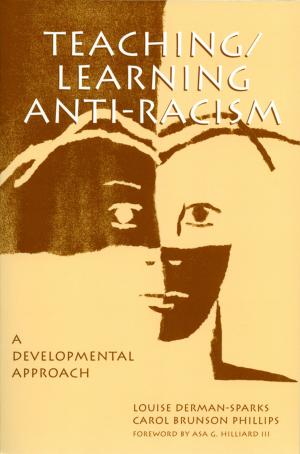Liberating Leadership Capacity
Pathways to Educational Wisdom
Nonfiction, Reference & Language, Education & Teaching, Educational Theory, Leadership| Author: | Linda Lambert, Diane P. Zimmerman, Mary E. Gardner | ISBN: | 9780807774786 |
| Publisher: | Teachers College Press | Publication: | December 15, 2009 |
| Imprint: | Language: | English |
| Author: | Linda Lambert, Diane P. Zimmerman, Mary E. Gardner |
| ISBN: | 9780807774786 |
| Publisher: | Teachers College Press |
| Publication: | December 15, 2009 |
| Imprint: | |
| Language: | English |
During the past quarter century, conceptions of leadership have evolved in concert with breakthrough discoveries in science and generative learning. Liberating Leadership Capacity captures these new ideas through the integration of the authors’ earlier works in constructivist leadership and leadership capacity. What emerges is a pathway through which educators can become the primary designers of their own learning and that of their students, thus creating sustainable systems of high leadership capacity. This vision of leadership reframes professional learning designs and knowledge creation, describing how these ideas are richly manifested in local, national, and international programs. The context is democratic communities; the learning is constructivist; the leadership is shared. The result is wise schools, organizations, and societies. Liberating Leadership Capacity speaks to all adult learners who are engaged in educational improvement.
Book Features:
- A new concept of leadership as fostering capacity through the complex, dynamic processes of purposeful, reciprocal learning.
- Leadership strategies constructed from the values of learning, democracy, equity and diversity.
- Professional learning designed to involve community members in building leadership capacity.
- A timely approach for the effective implementation of the Every Child Succeeds Act (S. 1177).
- An in-depth analysis of the standards movement through the lens of capacity building.
- An understanding of systemic change as an organic process arising from practice rather than being imposed on practice—approaches that unleash a sense of agency and wisdom.
“This book strikes a chord with those who believe that emerging leadership should define the experiences of students and teachers alike.”
—Deborah Walker, Collaborative for Teaching and Learning (CTL)
“The authors have designed a model that is at once sustainable, distributive, ecological, and transformational.”
—Dean Fink, author and consultant
“Describes organizational conditions that promote skillful dialogue, continual learning, building trust, and sharing a common vision among members. In such schools teachers become the leaders of learning and students become the leaders of the future.”
—Arthur L. Costa, professor emeritus, California State University, Sacramento
During the past quarter century, conceptions of leadership have evolved in concert with breakthrough discoveries in science and generative learning. Liberating Leadership Capacity captures these new ideas through the integration of the authors’ earlier works in constructivist leadership and leadership capacity. What emerges is a pathway through which educators can become the primary designers of their own learning and that of their students, thus creating sustainable systems of high leadership capacity. This vision of leadership reframes professional learning designs and knowledge creation, describing how these ideas are richly manifested in local, national, and international programs. The context is democratic communities; the learning is constructivist; the leadership is shared. The result is wise schools, organizations, and societies. Liberating Leadership Capacity speaks to all adult learners who are engaged in educational improvement.
Book Features:
- A new concept of leadership as fostering capacity through the complex, dynamic processes of purposeful, reciprocal learning.
- Leadership strategies constructed from the values of learning, democracy, equity and diversity.
- Professional learning designed to involve community members in building leadership capacity.
- A timely approach for the effective implementation of the Every Child Succeeds Act (S. 1177).
- An in-depth analysis of the standards movement through the lens of capacity building.
- An understanding of systemic change as an organic process arising from practice rather than being imposed on practice—approaches that unleash a sense of agency and wisdom.
“This book strikes a chord with those who believe that emerging leadership should define the experiences of students and teachers alike.”
—Deborah Walker, Collaborative for Teaching and Learning (CTL)
“The authors have designed a model that is at once sustainable, distributive, ecological, and transformational.”
—Dean Fink, author and consultant
“Describes organizational conditions that promote skillful dialogue, continual learning, building trust, and sharing a common vision among members. In such schools teachers become the leaders of learning and students become the leaders of the future.”
—Arthur L. Costa, professor emeritus, California State University, Sacramento















